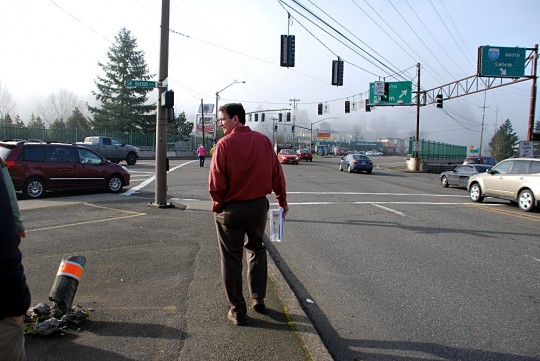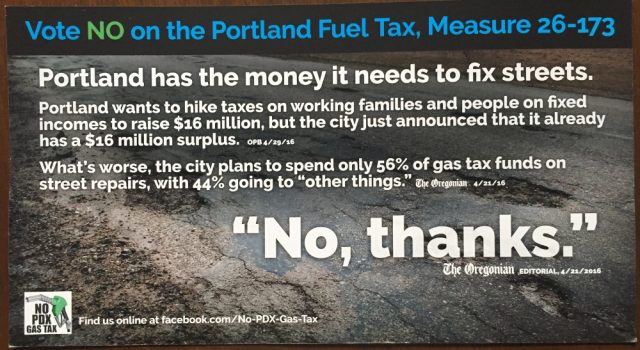
(Photo: M.Andersen/BikePortland)
Despite endorsements from big business, small business, every significant mayoral candidate and seemingly every civic or nonprofit organization in town, two major institutions oppose the gas tax on Portlanders’ ballots Tuesday: the oil industry and the Oregonian editorial page.
Last week, a poll showed the measure with a narrow lead. The oil industry responded Wednesday with their latest mailer (the “no” campaign has raised $165,000 so far, half of it from out of state) claiming that a tax on their product would be the worst idea ever.
But even amid fearmongering campaigns like these (do you suppose a growing city might have any needs in addition to road repair?), there are also a lot of honest misconceptions going around about this gas tax.
So, in the knowledge that something like one third of Oregonians don’t fill out their ballots until the last few days, here’s a quick guide to some myths (and one truth) about the gas tax that you might find helpful in discussing it with friends and family.
1) The gas tax would burden poor people
No, it wouldn’t. The 10-cent-per-gallon tax would raise $16 million per year, which comes to $5.18 per month per Portland household. (Yes, that’s per household, not per person or per adult. It also assumes that 100 percent of the cost would be passed to residents, which it wouldn’t.)
There are definitely households in Portland for whom $5.18 a month would be a significant burden. These households do not own cars.
2) 44 percent of the gas tax revenues would go to improving walking, biking and public transit access
Absolutely true! This is a very good reason to support the tax. It would pay for much-needed projects such as sidewalks on Capitol Highway, neighborhood greenways in East Portland, separated bike lanes downtown and crosswalk markings all over the place.
Portlanders pay $3,270 per household per year just to fuel and maintain their motor vehicles, let alone purchase and store them. This, not a 10-cent gas tax, is a huge burden on poor people. You may have also heard that it’s having some bad effects on the planet. You may have also noticed that local streets and freeways have become crowded with people driving their cars.
There is only one way to change this situation while growing economically: reducing driving. The changes to our streets that this gas tax would fund are a benefit for people who would like to use biking and public transit to get around but don’t currently find it safe, comfortable or convenient to do so and are therefore using their cars instead.
If you hate congestion, you should vote for the gas tax.
3) Spending money on anything except pavement maintenance is fiscally irresponsible
False.
Yes, Portland has a huge pavement maintenance problem and every dollar spent on pavement maintenance saves us $10 in the future. This is another very good reason to support this tax.
But pavement maintenance is not the only thing in the economy that has a return on investment. Increasing walking, biking and public transit does that too — in fact, it may have an even higher economic return than pavement maintenance.
Portland’s economy is doing well in part because our past investments in walking, biking and public transit are delivering economic returns.
Just about every city in the United States that paved its roads 100 years ago is facing a big problem as deferred maintenance comes due. Portland is actually doing better than many, because compared to most cities, our economy is going gangbusters. Why has Portland been adding jobs so fast that we can almost shrug off last month’s massive Intel layoffs? Why are public budgets gushing cash, giving us money we’re rapidly reinvesting in things like schools and bus service and affordable housing? In large part because 40 years of smart growth have turned Portland into a really nice place where people are really excited about living and working.
Chris Anderson, a local entrepreneur and walking-biking advocate, phrases it in an interesting way: walking and biking improvements in a city are self-financing, because every dollar invested delivers economic returns in reduced collisions, pollution, travel costs and so on, which can then be reinvested in more improvements.
We don’t know if that’s true, but it is definitely not true that the only device for making money is a steamroller. When The Oregonian editorial page and the oil industry use this as an excuse to oppose a gas tax, that’s the argument they’re trying to make.
Advertisement
4) A local gas tax is less efficient than a state gas tax
Theoretically, this would be true … if only we could count on our state to use the money wisely. Sadly, we can’t, so this is false.
We know exactly what the state government would like to spend gas tax money on, because it attempted to pass such a tax last year: widening freeways.
More lanes for suburban freeways are a great way to keep fuel taxes flowing indefinitely. They are not a good way to solve anyone’s problems for more than a few years.
This city-level tax would go toward two things: first, maintaining pavement we already have; second, reducing our local economy’s dependence on cars and therefore on this tax. Win win.
5) The gas tax excludes diesel, so trucks are getting off free
Nope. The city council unanimously approved a special trucking tax on Wednesday, and the freight industry is furious about it.
6) People who bike won’t have to pay the gas tax
False. 85 percent of Portlanders who bike to work also own cars. (For the record, so do 78 percent of BikePortland readers.) Bike users will pay every time they fuel up just like everyone else. The difference is that, if the gas tax passes, roads will be better and more people will choose to use bikes and transit. That’ll let those people fuel up less often — and people who still use cars won’t have to sit in traffic behind them.
If your household has to pay $5.18 a month for something, it may as well be that.
Ballots are due to ballot drop box sites 8 p.m. Tuesday. Obviously, BikePortland recommends a “yes” vote.
— Michael Andersen, (503) 333-7824 – michael@bikeportland.org
Our work is supported by subscribers. Please become one today.


